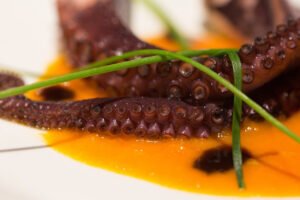Is this where the mobsters vacation? Alas, the name Mafia derives from the Arabic morfiyeh, meaning group or archipelago; the heaviest of heavies you’ll find on Mafia Island is a whale shark or two!
Belonging to Tanzania, and part of the Zanzibar Archipelago, Mafia Island is a peaceful paradise whose economy is based on fishing, subsistence agriculture, and the local market in Kilindoni. It’s a developing tourist spot (or it was, pre-pandemic), a haven for those in search of total relaxation, as well as game fishermen, scuba divers and snorkelers. And there’s good reason for this: the waters of the island are a protected marine nature reserve.
The main town, Kilindoni, boasts a number of makeshift restaurants and road-side stalls serving local lunch and dinner. One dish per stand is the order of the day, with simple octopus soup (boiled octopus with a squirt of lemon and a dash of salt) a particular Mafia favourite.

Fresh fruit is abundant with mangoes, pineapples and bananas always on sale along with the ubiquitous coconut, a local favourite. In fact, so popular are coconuts here on Mafia that a few enterprising residents have set up production of a coconut beer: rigging bottles at the top of the tree to collect a fermented sap that’s turned into a refreshingly unusual beverage.
But mainly it’s fish for dinner again. Or possibly ugali: a cheap and cheerful porridge made from maize flour cooked in boiling water or milk until it reaches a firm dough-like consistency. Rolled into a ball between the fingers, ugali is enjoyed all over the region, either hot with stewed meat or fish, or cold with veggies.







Click here to change your cookie preferences